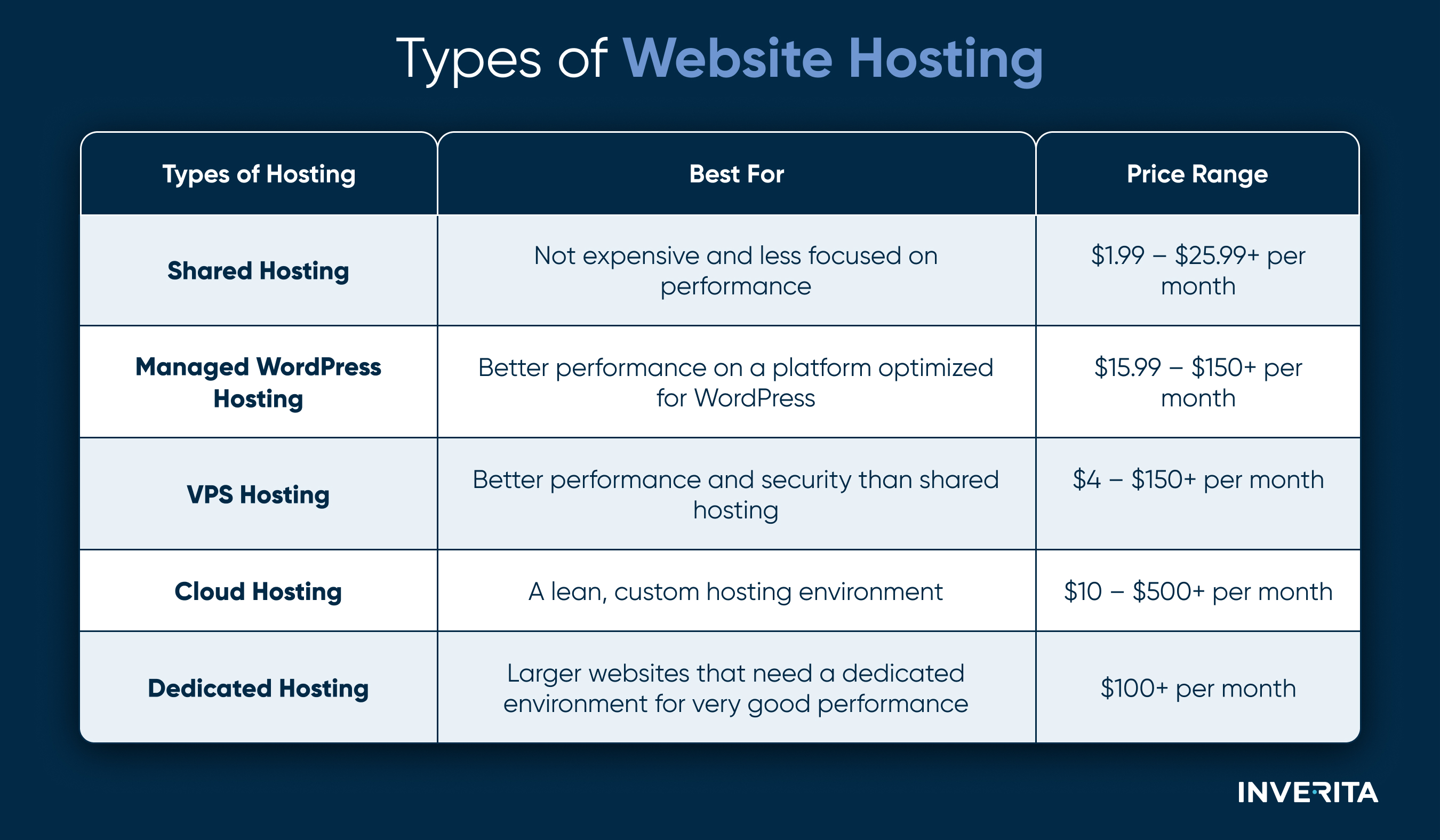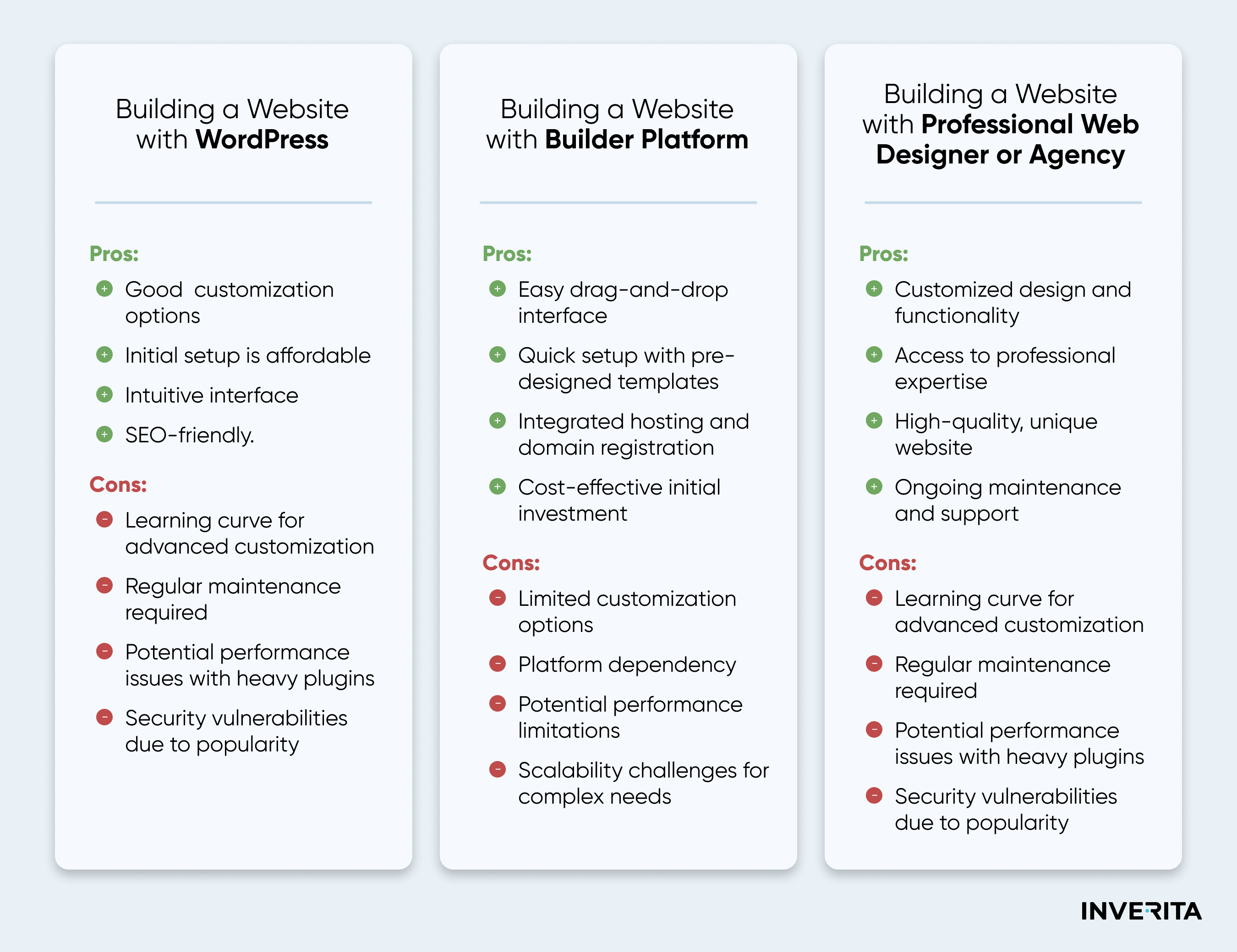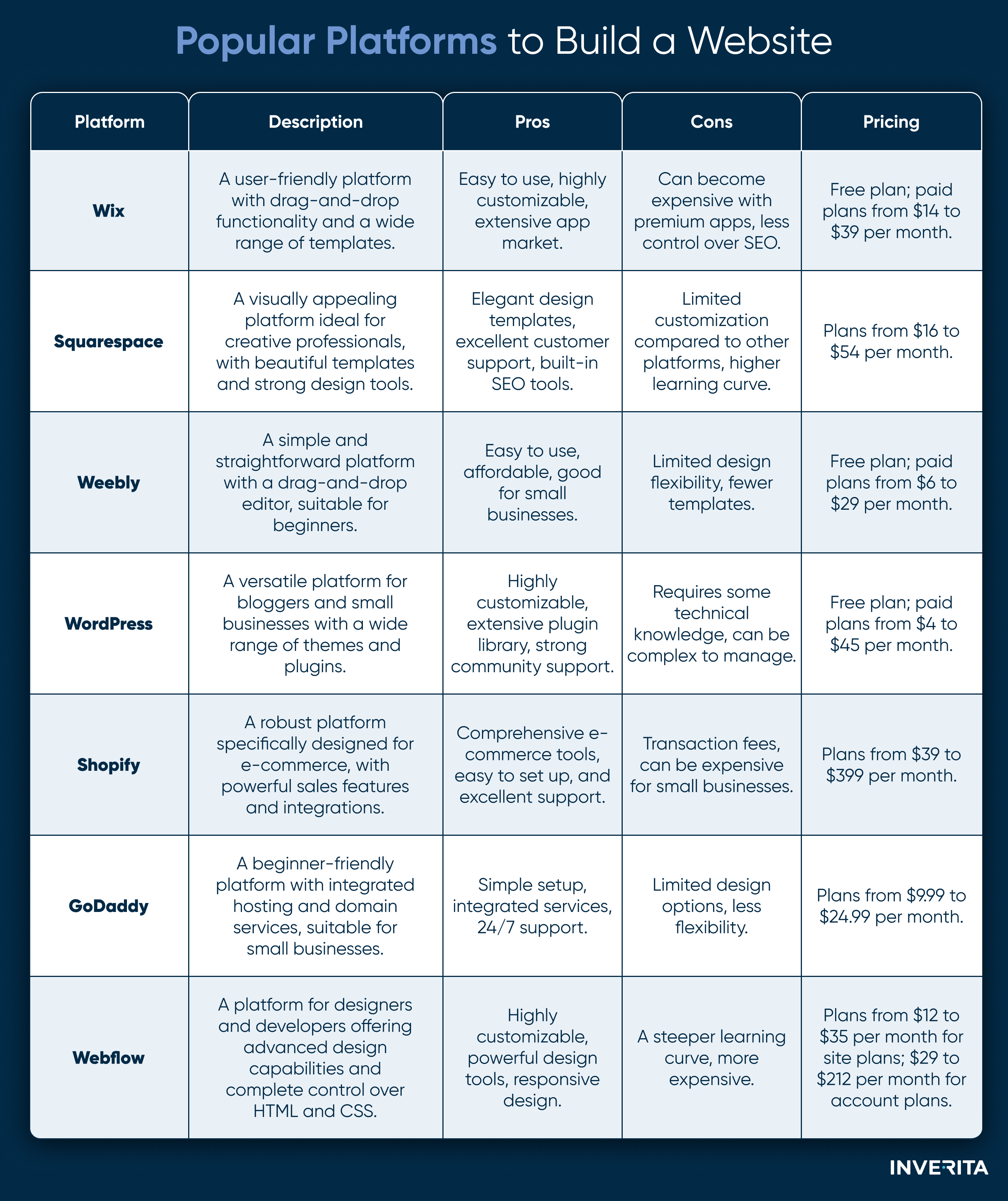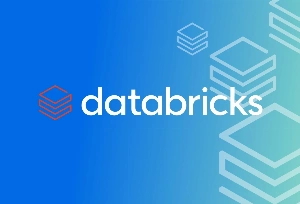In case you need a website with advanced functionality, you can opt for the third option - working with professionals.
- Building a Website with a Professional Web Designer or Agency
Estimated Price Range: $500 to $50,000 once
The cost of hiring a web developer is influenced by various factors. For instance, a straightforward site with a few pages and basic functionality will cost less than a complex site featuring advanced capabilities, such as eCommerce, custom designs, or integration with third-party systems. Custom designs, in particular, require significant time and effort, which can drive up costs.
Additionally, the developer’s expertise and geographical location play a significant role in determining their rates. Developers with extensive experience or those based in areas with higher living costs usually charge higher fees. This investment, however, often translates to a more polished and professional end product.
Content Creation
To unlock the full potential of your website, you need a strategic approach to marketing. Well-crafted blogs, landing pages, and other SEO-optimized content can significantly improve your website's visibility and ranking in search engine results.
You have options when it comes to executing your marketing strategy: investing in specialized tools that focus on specific marketing functions or hiring experts across different marketing disciplines. Hiring professionals often comes at a higher cost compared to licensing all-in-one marketing platforms.
Copywriting Costs
The cost of creating website copywriting can vary widely depending on several factors, including the scope of the project, the experience level of the copywriter, the complexity of the content needed, and the geographic location of the freelancer or agency. Here’s a general overview of what you might expect:
Freelance copywriters often charge hourly rates. These can range from around $50 to $150 per hour for experienced professionals who specialize in web copywriting.
Many copywriters prefer to quote on a per-project basis. For website copy, this could range from $500 to $5,000 or more, depending on the number of pages, the depth of content required, and the level of research involved.
Some copywriters charge by the word, especially for larger projects or ongoing content needs. Rates can vary from $0.10 to $1.00 per word or even higher for very specialized or technical content.
Some copywriters offer package deals for specific types of content, such as landing pages, blog posts, or SEO-optimized content bundles. These packages can range from a few hundred dollars to several thousand, depending on the complexity and length of the content.
If you hire a copywriting agency, rates may be higher due to overhead costs and the collective expertise they bring. Rates at agencies can start from $100 per hour and go up significantly depending on the agency’s reputation and clientele.
Multimedia Elements
Without multimedia the website is just a page loaded with piles of text, users won’t spend three seconds in. Unless you partner with a digital design agency or a freelance designer, you need to figure out where you can get multimedia elements yourself.
Platforms like Shutterstock, Adobe Stock, and Getty Images offer a wide range of high-quality images and videos for commercial use.
On sites like Unsplash, Pexels, and Pixabay you can find free high-resolution photos and videos under creative commons licenses.
Create yourself in Canva or Crello. They offer a vast library of images, icons, and templates.
Vimeo and YouTube offer video content, while services like Animoto and Biteable help create custom videos.
Google Fonts and Adobe Fonts provide extensive collections of free and premium fonts to customize your site’s typography.
Icons8, Flaticon, and FontAwesome offer a wide range of free and premium fonts to customize your site’s typography.
Workflow Optimization Software
Making a website cost also includes a variety of tools designed to streamline different aspects of web management. These tools include project management platforms which organize tasks, timelines, and team collaboration to ensure projects stay on track. Automation tools enable seamless integration between different web applications, automating repetitive tasks and workflows. CRM systems and customer support platforms optimize interactions with visitors and customers, improving user experience and retention.
Here are some of the most popular options with an estimated cost:
A project management tool that uses boards, lists, and cards to organize tasks and workflows collaboratively. Trello offers a free basic plan with optional paid plans starting at $12.50 per user/month for advanced features.
Hubspot offers CRM and marketing automation tools that optimize workflows for lead nurturing, customer service, and sales processes. The platform provides CRM tools for free, with marketing automation plans starting at $45 per month, scaling with additional features.
Known for its flexibility and extensive plugin ecosystem, WordPress powers a significant portion of websites worldwide. It's open-source and free to use, with additional costs for premium themes and plugins from $20 to $100 or more.
Drupal is another open-source CMS known for its scalability and security features, favored by larger organizations and developers. It offers a robust framework for complex websites and custom applications.
It’s suitable for building various types of websites, from simple blogs to complex E-commerce platforms. It's open-source and free to use, with optional premium templates and extensions that usually come from $20 to $100 or more.
Maintenance and Security
Regular Updates
Estimated Price Range: $50 to $1,000
Any website needs a tune-up. The website maintenance tasks include updating plugins, adding new content, monitoring website speed and performance using tools like Google PageSpeed Insights or GTmetrix. You should also regularly check contact forms, checkout processes (for eCommerce sites), and other interactive elements to ensure they work correctly, etc.
Security and Backups
Estimated Price Range: $50 to $5,000
Building website cost also includes performing security audits, scanning for malware, and implementing security measures like SSL certificates, firewalls, and strong passwords to protect against hacks and data breaches. You should regularly back up your website files and databases to ensure you can restore them in case of data loss or corruption.
You can use free security plugins or online scanners, typically ranging from free to $50 per year for premium features, or outsource to managed service providers.
SSL Certificate
Estimated Price Range: $0 to $1,500
One of the important factors that influence the average price for building a website is a SSL certificate.
An SSL certificate is essential for protecting both your company and your site's visitors by encrypting the transfer of sensitive data. This certificate is visible in your URL, signaling to users that their information is secure.
Also, browsers like Chrome also warn users when a site lacks a valid SSL certificate, further deterring potential customers.
While many vendors sell SSL certificates, some organizations offer them for free. However, experts typically recommend investing in a paid SSL certificate, as it often provides additional protections like higher warranties and advanced encryption.
DigiCert, Comodo/Sectigo, Symantec, GoDaddy, GlobalSign, and others offer various SSL certificate options from basic to advanced encryption.
Additional Functionalities
Integrating E-commerce
Estimated Price Range: $2,000 to $25,000
Adding E-commerce functionality covers essential tasks such as implementing payment processing systems, setting up payment gateways, testing shopping carts, and launching product pages.
Effective E-commerce functionality is crucial for enabling online sales and ensuring seamless order processing. The cost varies depending on factors like product line size, order volume, and business size, with larger retailers typically requiring more robust systems due to their extensive product offerings and higher transaction rates.
SEO and Analytics Tools
Estimated Price Range: $20 to $10,000
Search engine optimization is an essential part of the cost to make a website, but unfortunately, frequently ignored.
Since 80% of shoppers initiate their product research online, having a strong SEO presence is essential. If your company doesn’t appear in search results, consumers are unlikely to even know you exist, drastically diminishing your chances of converting those potential shoppers into actual customers.
Basic tools like Moz, Ahrefs, and SEMrush offer entry-level plans starting at approximately $20 to $100 per month, while more advanced features and enterprise-level solutions can cost between $200 to $500 or more per month.
Hiring SEO professionals can vary significantly in cost based on the scope of services, expertise, and location. On average, SEO specialists charge between $75 to $200 per hour. Monthly retainers for ongoing SEO services typically range from $500 to $5,000 or more, depending on the complexity and competitiveness of the project. For comprehensive SEO campaigns, especially for larger businesses, costs can range from $2,500 to $10,000 per month or higher.
Industry-Specific Considerations
Industry-specific considerations are crucial to ensure the site meets the unique needs and expectations of your target audience. Here are some key factors to consider for various industries:
High-quality product pages with detailed descriptions, customer reviews, and efficient search functionality are crucial, as are multiple payment gateways like credit cards and PayPal. Implement robust security measures, such as SSL certificates and PCI compliance, to protect sensitive data.
Healthcare websites need to comply with HIPAA and other privacy regulations, offering secure online appointment booking and patient portals. Accessibility for people with disabilities is vital, as is establishing trust through certifications, doctor profiles, and patient testimonials.
Easy-to-update content management for courses, schedules, and events, along with support for e-learning tools like video lectures and interactive modules. Secure student portals for accessing grades and assignments, responsive design for all devices, and community engagement through forums and social media integration are essential components.
High-level security measures to protect sensitive information and comply with financial regulations. Offer secure user accounts, and financial tools like calculators and investment trackers, and provide educational content and market updates to inform and engage users.
Easy-to-use donation forms integrated with payment gateways, clear communication of the organization's mission and impact, and information on volunteer opportunities.
Technology and SaaS websites require detailed product information, feature lists, and case studies, along with easy access to demos and free trials. Include comprehensive support resources, fast and reliable performance, and regular updates on product enhancements and industry trends.
Website Building Methods and Costs
Here is a short sum-up of the average price to build a website depending on the method you choose.










